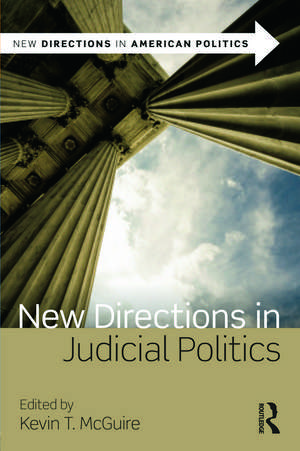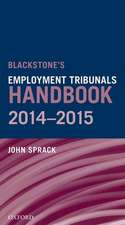New Directions in Judicial Politics: New Directions in American Politics
Editat de Kevin T. McGuireen Limba Engleză Paperback – 5 mar 2012
In addition to presenting a set of conclusions about the way in which courts operate, this book also models the craft of political research, illustrating how one can account for a variety of factors that might affect the courts and how they operate. The renowned scholars and teachers in this volume invite critical thinking, not only about the substance of law and courts in America, but also about the ways in which we study judicial politics.
| Toate formatele și edițiile | Preț | Express |
|---|---|---|
| Paperback (1) | 490.25 lei 6-8 săpt. | |
| Taylor & Francis – 5 mar 2012 | 490.25 lei 6-8 săpt. | |
| Hardback (1) | 854.51 lei 6-8 săpt. | |
| Taylor & Francis – 5 mar 2012 | 854.51 lei 6-8 săpt. |
Din seria New Directions in American Politics
-
 Preț: 491.17 lei
Preț: 491.17 lei -
 Preț: 281.42 lei
Preț: 281.42 lei -
 Preț: 414.48 lei
Preț: 414.48 lei -
 Preț: 488.29 lei
Preț: 488.29 lei -
 Preț: 468.36 lei
Preț: 468.36 lei - 15%
 Preț: 443.27 lei
Preț: 443.27 lei -
 Preț: 402.42 lei
Preț: 402.42 lei -
 Preț: 417.20 lei
Preț: 417.20 lei
Preț: 490.25 lei
Nou
Puncte Express: 735
Preț estimativ în valută:
93.81€ • 98.30$ • 77.55£
93.81€ • 98.30$ • 77.55£
Carte tipărită la comandă
Livrare economică 12-26 aprilie
Preluare comenzi: 021 569.72.76
Specificații
ISBN-13: 9780415893329
ISBN-10: 0415893321
Pagini: 360
Ilustrații: 17 tables and 36 line drawings
Dimensiuni: 152 x 229 x 20 mm
Greutate: 0.48 kg
Ediția:New.
Editura: Taylor & Francis
Colecția Routledge
Seria New Directions in American Politics
Locul publicării:Oxford, United Kingdom
ISBN-10: 0415893321
Pagini: 360
Ilustrații: 17 tables and 36 line drawings
Dimensiuni: 152 x 229 x 20 mm
Greutate: 0.48 kg
Ediția:New.
Editura: Taylor & Francis
Colecția Routledge
Seria New Directions in American Politics
Locul publicării:Oxford, United Kingdom
Cuprins
Part I: Selecting Judges 1. Selecting Justice: Strategy and Uncertainty in Choosing Supreme Court Nominees Christine L. Nemacheck 2. The Role of Public Opinion in Supreme Court Confirmations Jonathan P. Kastellec, Jeffrey R. Lax, and Justin Phillips 3. Campaign Contributions and Judicial Decisions in Partisan and Nonpartisan Elections Damon M. Cann, Chris W. Bonneau, and Brent D. Boyea Part II: Trial Courts 4. Race and Death Sentencing Isaac Unah and John Charles Boger 5. Under-Estimating and Over-Estimating Litigation: How Activist Plaintiffs May Advance Their Causes Even As They Lose Their Cases William Haltom and Michael McCann Part III: Appellate Courts 6. Patterns of Policy Making across State Supreme Courts Scott A. Comparato, Scott D. McClurg, and Shane A. Gleason 7. Decision Making in the U.S. Courts of Appeals: The Determinants of Reversal on Appeal Virginia A. Hettinger and Stefanie A. Lindquist 8. Supreme Court Agenda Setting: Policy Uncertainty and Legal Considerations Ryan C. Black and Ryan J. Owens 9. The Origin and Development of Stare Decisis at the U.S. Supreme Court Timothy Johnson, James F. Spriggs, II, and Paul J. Walhbeck 10. Bargaining and Opinion Writing on the U.S. Supreme Court Tom S. Clark Part IV: Courts and Their Political Environments 11. Goldilocks and the Supreme Court: Understanding the Relationship between the Supreme Court, the President, and the Congress Michael A. Bailey and Forrest Maltzman 12. Interest Groups and Their Influence on Judicial Policy Paul M. Collins, Jr. 13. Public Opinion, Religion, and Constraints on Judicial Behavior Kevin T. McGuire Part V: Implementation and Impact 14. Lower Court Compliance with Precedent Sara C. Benesh and Wendy L. Martinek 15. Why Strict Scrutiny Requires Transparency: The Practical Effects of Bakke, Gratz, and Grutter Richard Sander
Recenzii
"This book presents an extraordinary collection of research on the courts. The quality and importance of the scholarship included in the book and the effectiveness with which the authors communicate their work make New Directions in Judicial Politics a valuable resource for both students and scholars."
—Lawrence Baum, Ohio State University
"Filled with an impressive range of original social science research on the judicial process, this book will provide students of judicial politics with insights from the field’s leading scholars."
—Susan Haire, University of Georgia
"In this latest volume, Kevin McGuire has organized a terrific selection of essays that collectively paint a fascinating portrait of American courts in contemporary society. The contributing authors, who represent a perfect blend of accomplished senior scholars and the brightest up-and-coming stars, use rigorous empirics to take us significantly beyond the simple understandings of the past to the complex realities of the judicial process in American politics. Many of these works challenge the conventional wisdom and address some of the most important controversies of the day. This fascinating collection represents the very best of modern judicial politics scholarship and is a must-read for any student of American politics."
—Melinda Gann Hall, Michigan State University
"This is a highly accessible collection of cutting edge scholarship on judicial politics. It is likely to both challenge and intrigue students."
—Banks Miller, The University of Texas at Dallas
"What a terrific volume Kevin McGuire has put together. Covering the major areas of Judicial Politics, McGuire has obtained the services of the best of the middle generation of judicial scholars, i.e., those experienced enough to know what matters but young enough to still be on the cutting edge of theory and methods."
—Jeffrey Segal, Stony Brook University
"New Directions in Judicial Politics showcases work from leading scholars of law and courts. The breadth of substantive coverage and the careful approach to research design evident in each chapter make this volume not only a fine summary of the state of American judicial politics, but a useful teaching tool at the graduate and undergraduate levels."
—Jeffrey Staton, Emory University
—Lawrence Baum, Ohio State University
"Filled with an impressive range of original social science research on the judicial process, this book will provide students of judicial politics with insights from the field’s leading scholars."
—Susan Haire, University of Georgia
"In this latest volume, Kevin McGuire has organized a terrific selection of essays that collectively paint a fascinating portrait of American courts in contemporary society. The contributing authors, who represent a perfect blend of accomplished senior scholars and the brightest up-and-coming stars, use rigorous empirics to take us significantly beyond the simple understandings of the past to the complex realities of the judicial process in American politics. Many of these works challenge the conventional wisdom and address some of the most important controversies of the day. This fascinating collection represents the very best of modern judicial politics scholarship and is a must-read for any student of American politics."
—Melinda Gann Hall, Michigan State University
"This is a highly accessible collection of cutting edge scholarship on judicial politics. It is likely to both challenge and intrigue students."
—Banks Miller, The University of Texas at Dallas
"What a terrific volume Kevin McGuire has put together. Covering the major areas of Judicial Politics, McGuire has obtained the services of the best of the middle generation of judicial scholars, i.e., those experienced enough to know what matters but young enough to still be on the cutting edge of theory and methods."
—Jeffrey Segal, Stony Brook University
"New Directions in Judicial Politics showcases work from leading scholars of law and courts. The breadth of substantive coverage and the careful approach to research design evident in each chapter make this volume not only a fine summary of the state of American judicial politics, but a useful teaching tool at the graduate and undergraduate levels."
—Jeffrey Staton, Emory University
Descriere
With its often vague legal concepts and institutions that operate according to unfamiliar procedures, judicial decision-making is, in many respects, a highly enigmatic process. New Directions in Judicial Politics seeks to demystify the courts, offering students the insights of empirical research to address questions that are of genuine interest to students.












